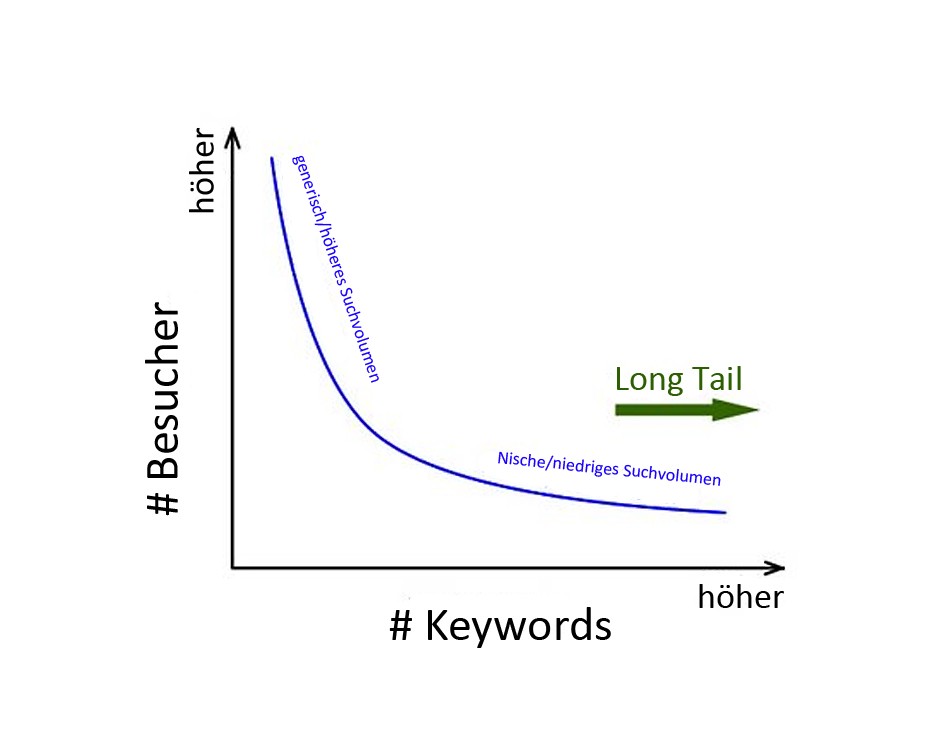
Blog Post
SEO

Nadine
Wolff
published on:
23.03.2012
The Long Tail Strategy: The Pros and Cons of Short Head Keywords and Keyword Research
Table of Contents
The classic foundation of on-page optimization is keyword research: High-traffic keywords are identified, compared with synonyms and related terms, and search volume is evaluated. In the advanced version, a keyword potential analysis is also conducted, and the identified keywords are structured using mapping. This week on seo-theory.com, there was an article suggesting an interesting and somewhat unconventional approach to keyword optimization. In a nutshell, it’s about ignoring the hard keywords, not conducting keyword research, but instead focusing on content and long-tail keywords. A suggestion that we find not only intriguing but also worthy of discussion.

Long Tail Brings the Largest Share of Traffic
Anyone who looks at the analytics numbers of different websites will quickly realize: the majority of traffic does not come through short head keywords. Instead, it is the long tail that accounts for the significant share of visits. Against this background, it seems a bit questionable that long-tail keywords are generally neglected, and instead, the focus is exclusively on high-traffic single keywords. The problem is: the long tail is hardly researchable. The Google Keyword Tool is practically of no help here, only with a very large amount of time could at least a portion of the long-tail keywords be identified.
Is Keyword Research Even Useful Then?
Classic SEO theory suggests: Ideally, keyword research should be conducted before creating content. The researched keywords are then typically used for title tags, headlines, content, and so on. However, if the long tail promises much more traffic, keyword research seems unnecessary. According to the thesis from seo-theory.com, research can be completely omitted, but we see this a bit differently.
Of course, the bulk of long-tail keywords comprises most of the traffic, and naturally, these keywords cannot be identified through research. It’s still important, especially for strong pages like homepages, categories, and subcategories, to analyze the search volume of the most important keywords and determine what users are actually searching for. Even if initially no traffic is expected from highly competitive keywords, by optimizing a page for a specific single keyword, good conditions are simultaneously created for traffic over a range of related long-tail keywords. For overview pages, it also makes perfect sense to optimize for generic terms. And these terms can indeed only be identified with the help of keyword research. Aside from that, research can also provide inspiration for topics worth writing about. The focus should clearly be on the added value for the user; no content should be created solely for SEO reasons!
Long-Term Keyword Strategies: How to Optimize for the Long Tail?
Basically, it can be stated: Anyone who optimizes only for generic keywords is missing out on the vast traffic potential of long-tail keywords. Yet, it is equally true: With a larger quantity of text, it is practically impossible NOT to also optimize for the long tail. A content strategy always includes the identification of the most important high-traffic keywords within one's subject area. When creating articles, blog posts, and product descriptions, one should break away from the rigid notion of optimizing content solely for short-head keywords. Texts should never be forcibly trimmed for a specific keyword. A natural and varied language focusing on a particular topic and written with a certain editorial quality fulfills the main criteria for being found in search results for relevant long-tail keywords.
An important aspect here is the competence of the editorial team: Only those who are reasonably familiar with a topic or have familiarized themselves with it intuitively use the most important terms and answer the key questions through which potential users can access the site. On seo-theory.com, the recommendation is to not think about keywords at all but to just start writing and producing helpful and relevant content. Everything else will follow naturally. We can generally agree with this, but with the aforementioned caveat. Also, it won't hurt to apply a few simple SEO basics, such as ensuring that the headline and title tag contain relevant keywords. The popular topic of "SEO copywriting" is always a mixture of SEO expertise, subject matter knowledge, and a great deal of creativity. A little less obsession with keyword optimization certainly can’t hurt!
Strategic Consulting from the Online Experts
With over 10 years of experience in online marketing, we understand the short- and long-term success opportunities of various keyword strategies. We are happy to also support you and your company through individual strategic advice on all questions of online marketing. Get in touch with us!

Nadine
Wolff
As a long-time expert in SEO (and web analytics), Nadine Wolff has been working with internetwarriors since 2015. She leads the SEO & Web Analytics team and is passionate about all the (sometimes quirky) innovations from Google and the other major search engines. In the SEO field, Nadine has published articles in Website Boosting and looks forward to professional workshops and sustainable organic exchanges.


